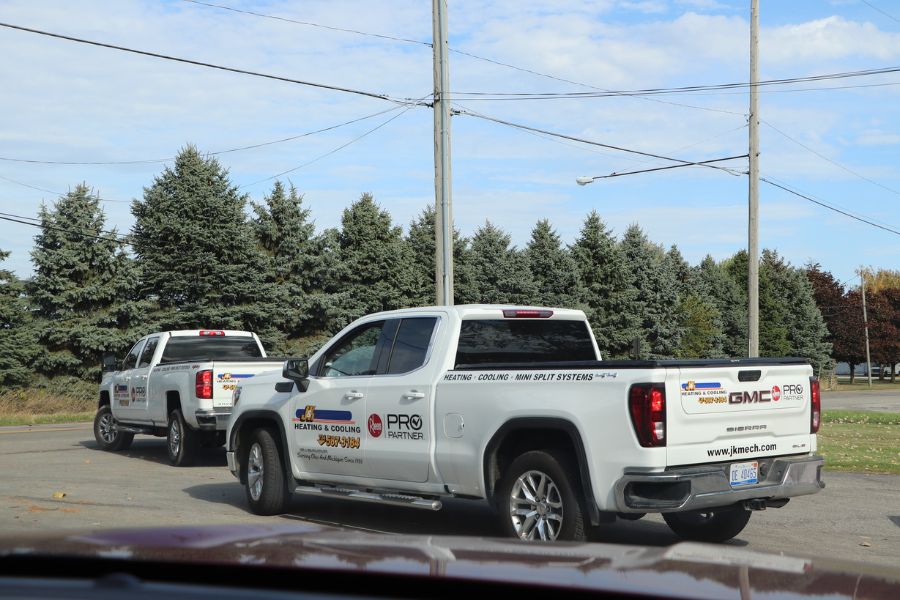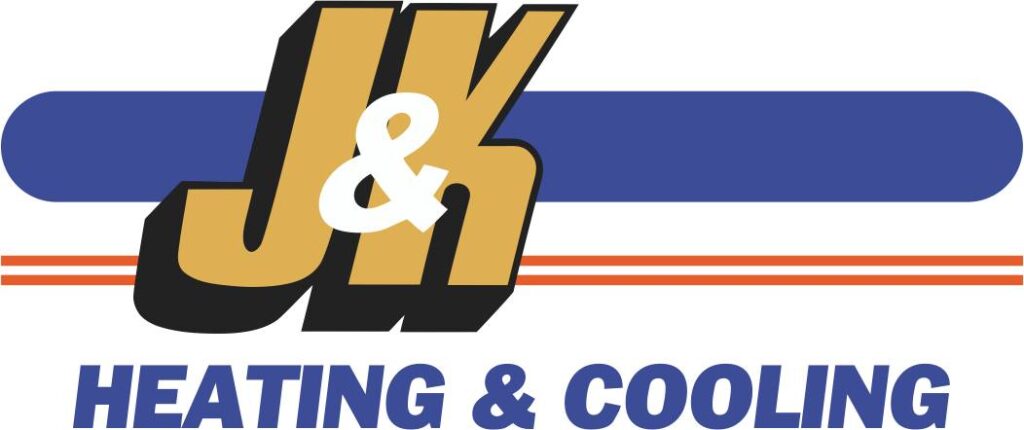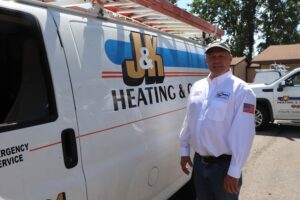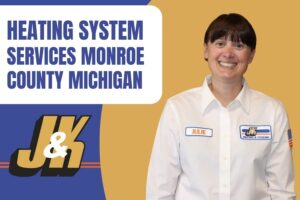Many Monroe, Michigan, residents often rely on their gas furnaces to provide much-needed comfort and warmth. However, sometimes furnaces can fail, and problems can occur, which makes a gas furnace replacement needed to keep your home warm and cozy. While we offer gas furnace replacement here at J&K Heating and Cooling, there are some things you’ll need to consider when getting a new gas furnace, which we’ll cover below.
Types of Gas Furnaces
Several types of gas furnaces are available on the market, each with its own features and benefits. Understanding their differences can help you choose the best option for your home. From single-stage and two-stage furnaces to modulating and condensing models, this guide will break down the various types of gas furnaces to help you decide on your heating needs.
Standard and High-Efficiency Models
Standard models are typically less energy-efficient compared to high-efficiency models. They consume more energy, resulting in higher utility costs for homeowners. In terms of performance, traditional models may provide a different level of temperature control and comfort than high-efficiency models. However, they are generally more affordable upfront.
On the other hand, high-efficiency models are designed to minimize energy usage, leading to lower utility bills for homeowners. These models often meet industry standards and certifications for energy efficiency, such as ENERGY STAR. They provide improved performance, offering better temperature control and comfort in the home. While high-efficiency models may have a higher initial cost, homeowners can expect long-term savings on energy expenses.
Specific features of high-efficiency models may include advanced insulation, variable-speed motors, and enhanced heating and cooling technology. These features contribute to lower energy consumption and reduced environmental impact. While still effective in heating and cooling, standard models may offer a different level of energy efficiency and environmental benefits than their high-efficiency counterparts.

Single Stage, Two Stage & Variable Speed Models
Single-stage, two-stage, and variable-speed models are all types of HVAC systems with different features and functionalities.
Single-stage models have only one level of operation, providing either full-blast heating or cooling. They are the most common and affordable option but may lead to temperature fluctuations and higher energy consumption.
Two-stage models have two operation levels, allowing for better temperature control and energy efficiency. They can operate at a lower, more energy-efficient setting and shift to high for extreme temperatures.
Variable speed models, modulating or multi-stage models, have a wide range of operations, allowing for precise and consistent temperature control. They are the most energy-efficient, providing the best humidity control, air quality, and noise reduction.
Condensing vs. Non-Condensing Models
Condensing boilers are more energy efficient than non-condensing models because they are designed to capture and reuse heat that would otherwise be lost in the combustion process. They extract heat from the exhaust gases through a secondary heat exchanger, allowing them to achieve up to 98% energy efficiency ratings. On the other hand, non-condensing boilers release exhaust gases directly into the atmosphere, resulting in lower energy efficiency ratings of around 80-85%.
The advantages of condensing boilers include lower energy bills and reduced carbon emissions. They can also qualify for various rebates and incentives due to their high energy efficiency. However, they are more expensive upfront and may require more maintenance. Non-condensing boilers are typically cheaper to purchase and install but are less energy efficient and may result in higher energy bills over time.
Cost Considerations for Installing a Gas Furnace
When it comes to keeping your home warm during the cold winter months, installing a gas furnace is a popular choice for Monroe County, Michigan homeowners. However, before making this investment, it’s essential to consider the various costs associated with installing and operating a gas furnace.
From the initial purchase and installation costs to ongoing maintenance and energy bills, there are several factors to consider when deciding if a gas furnace is the right choice for your home. By understanding these cost considerations, homeowners can make informed decisions about their heating systems, ensuring comfort and affordability throughout the winter.
Upfront Costs & Installation Fees
Regarding our services for Monroe County, Michigan homeowners, we believe in transparency and no unexpected costs. Our upfront costs and installation fees are clearly outlined, and no hidden charges or upcharges exist.
Our pricing model is straightforward, with all costs detailed before work begins. Customers can expect to pay installation fees, which will be communicated upfront. There are no unexpected fees or surprise charges – what you see is what you get.
We understand that the uncertainty of potential extra fees can be stressful for homeowners, so we communicate all costs upfront. When you work with us, you can trust that the pricing model is transparent and that you won’t encounter any unexpected fees. We believe in being upfront about all costs so that you can feel confident in the pricing structure and our commitment to honesty and fairness.

Energy Efficiency Ratings & Rebates/Tax Credits
In Northwest Ohio, Southeast Michigan, and Monroe County, Michigan, homeowners can use various rebates and tax credits for energy-efficient HVAC systems. The available energy efficiency ratings for HVAC systems typically include AFUE (annual fuel utilization efficiency) for furnaces, SEER (seasonal energy efficiency ratio) for air conditioners, and HSPF (heating seasonal performance factor) for heat pumps. The corresponding rebates or tax credits can vary depending on the specific energy efficiency ratings achieved by the HVAC system.
To qualify for these rebates or tax credits, homeowners may need to meet specific criteria such as purchasing and installing qualifying HVAC equipment, using a licensed contractor, and providing documentation of the energy efficiency ratings. The application process may involve:
- Submitting proof of purchase and installation.
- Completing an application form.
- Meeting any deadlines set by the rebate or tax credit program.
By taking advantage of these incentives, homeowners can save money on their initial investment in an energy-efficient HVAC system and reduce their energy consumption and environmental impact.
Ongoing Operational Costs & Maintenance Tips
As a homeowner in Monroe County, Michigan, it’s essential to consider your property’s ongoing operational costs and maintenance tips. At Above & Beyond Service & Repair, we understand the need for cost-effective solutions and long-term maintenance strategies. Our 15 years of experience in the industry has given us insight into the most efficient ways to keep your home in top condition.
Regarding operational costs, regular maintenance is critical to avoiding costly repairs. By prioritizing routine inspections and addressing any issues promptly, you can minimize the impact on your budget. Our repair service emphasizes the importance of proactive maintenance to prevent more significant, more expensive problems from arising.
For long-term maintenance, we recommend investing in high-quality materials and professional installation to ensure the longevity of your home’s systems and structures. Regular cleaning and upkeep also play a crucial role in preserving the condition of your property.
Should You DIY a Gas Furnace Replacement?
As a Monroe County, Michigan homeowner, you may be considering DIY gas furnace replacement to save money. However, there are significant risks and challenges associated with this undertaking. Gas furnace replacement involves potential safety hazards such as gas leaks, carbon monoxide exposure, and improper installation, leading to fire hazards. The complexity of the installation process also requires specific skills, tools, and equipment, including knowledge of gas line connections and electrical wiring.
Hiring a professional HVAC technician for the job is highly recommended. They have the expertise, training, and safety protocols to ensure a successful and safe gas furnace replacement. A professional technician can also correctly size and install the furnace for maximum efficiency and comfort in your home. Ultimately, the benefits of hiring a professional outweigh the risks and challenges of attempting a DIY gas furnace replacement. Don’t compromise the safety and functionality of your home’s heating system – trust the experts.
Get a Quote from a Qualified HVAC Professional
Are you ready to experience the ultimate comfort and energy efficiency with a new gas furnace installation in Monroe, Michigan? Look no further! Call J&K Heating and Cooling today at 734-587-3184 for a personalized quote and expert guidance on upgrading your home’s heating system. Don’t let the cold months catch you off guard – take the first step towards a warmer, cozier home with J&K Heating and Cooling.
Frequently Asked Questions
There are three main types of furnaces: gas, oil, and electric. Gas furnaces are the most popular choice due to their efficiency and cost-effectiveness, while oil furnaces are commonly found in older homes. Electric furnaces are less common but may be suitable for specific homes.
AFUE stands for Annual Fuel Utilization Efficiency and measures a furnace’s efficiency. The higher the AFUE rating, the more efficiently the furnace converts fuel to heat. In Monroe County, choosing a furnace with a high AFUE rating is essential to achieve optimum comfort levels and energy savings in your home.





